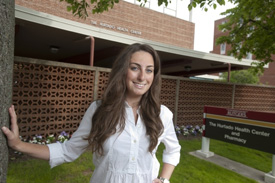For SAS student, saga of immigration becomes a lesson on life’s values

Rebekka Idesis’s journey to Rutgers took her from Tashkent, Uzbekistan, to Italy, Chicago, and Manhattan, and then finally to New Brunswick. Along the way, she developed an immigrant’s ethos for hard work and perseverance, and a healthy respect for the parents who gave up almost everything to bring her here.
“I have a lot to live up to,” says Idesis, who will receive her bachelor’s degree from Rutgers’ School of Arts and Sciences this month with major in women’s and gender studies and a minor in biology.
In the former Soviet republic of her birth, Jews were forbidden to practice their faith. Life for the so-called “refuseniks” – those requesting to leave Mother Russia for religious purposes – was treacherous. Applying to emigrate branded them as enemies of the state.
With an uncle about to be drafted into the army, the family doubled its efforts to leave. When the long-awaited visa arrived in 1989, Idesis’s family gathered up a few belongings and headed to the United States, arriving when Rebekka was 9 months old.
“Most of the Jews fled between the 1970s and the early ’90s, the critical years for emigration,” Idesis says. “In 1990, America closed its doors. We made it out just in time.”
Their trip included a six-month detour in Italy, while the necessary paperwork was processed. By the time the extended family arrived in Chicago, Idesis’s mother, Zhanna, had given up on her medical school dreams, opting for classes that would lead to a pharmacy degree.
“When we moved to Chicago, we lived in a tiny apartment with my mom, my uncle, and my grandparents. My parents separated when I was 1, so I was always with my mom’s family,” Idesis recalls. The relatives studied English together, older generations learning alongside younger.
Today the immediate family lives in Livingston. Idesis’s mother is a pharmacist; her stepfather – also from Uzbekistan – is a bond trader. Her grandmother and uncle own The Russian Tea Time, a landmark restaurant in the heart of Chicago’s artistic center that features brass samovars and balalaika music.
Their collective achievements and the barriers they overcame were not lost on the young Rebekka, who turned to social activism as a way of acknowledging her loved ones’ experiences – a saga she terms both “intimidating and inspiring.”
As an undergraduate at the Institute for Women’s Leadership (IWL) -- a consortium of eight units of Rutgers focusing on women's leadership in education, research, politics, science, the arts, the workplace and the world -- Idesis was required to complete a one-semester internship.
She spent spring semester of her junior year at the Hurtado Health Center, filing old prescriptions; interacting with students, faculty, and staff; and creating presentations on stress relief and nutrition.
At a table outside the pharmacy on Bishop Place, Idesis distributed literature and engaged passersby in conversation about the adverse effects of tension.
Stress “puts you in a state of shock; the body has to constantly adjust. Plus as students, we’re always drinking coffee, and the caffeine keeps your body in a constant state of panic,” she told them. “That also keeps you from sleeping well, and puts stress on your heart, your breathing and your overall well-being.”
Among her stress-busting suggestions: breathe in the scent of peppermint to widen nasal openings and increase the flow of air, and learn which points on the head and neck respond to soothing pressure.
Also as part of her IWL curriculum, Idesis paired with Michelle Szymanski, now an SAS junior, for a social-action project educating women about potential dangers in cosmetics and other everyday products.
Taking inspiration from her mother – a longtime health and nutrition advocate -- she targeted chlorine in tampons, parabens (chemical preservatives) commonly found in shampoos and facial washes, and aluminum in deodorants. All have been linked with health risks, including breast cancer.
The students presented their findings at the Bunting-Cobb Dorm on the Douglass Residential Campus, where about 60 female Rutgers undergraduates came to listen.
In addition to preparing an information session, a video and a PowerPoint presentation, Idesis and Szymanski assembled packages of toiletries free of the suspect ingredients to distribute to their classmates.
“The goal was not to scare them or to get them to put away all their products, but to increase awareness and empower women before they put 30 or 40 years’ worth of toxins in their bodies,” Idesis recalls. “Basically, it was to get them to look at what products they’re using, not just to apply them automatically.”
Life after graduation may involve pharmacy school, or a job in a hospital or pharmacy. It may also include a trip to Uzbekistan, a pilgrimage she says she has not yet made because of the dangers of Taliban influence.
She credits her experiences at Rutgers and the Institute for Women’s Leadership with “giving me a sense of who I am as a person, a deep understanding of what leadership means, and an understanding of the type of experience I want to have in the future. It was a great foundation for entering the real world.”